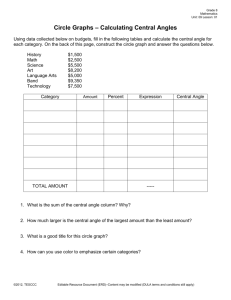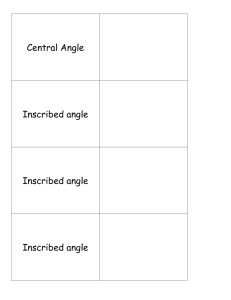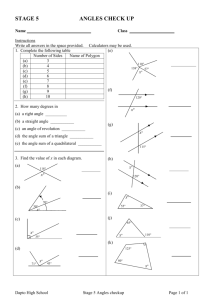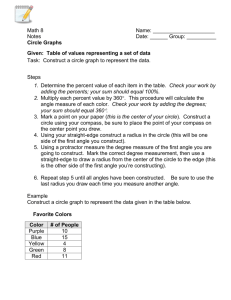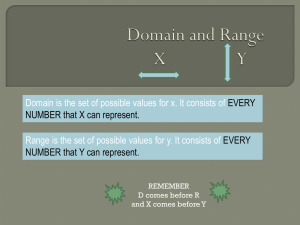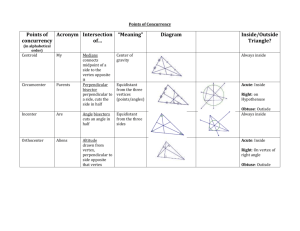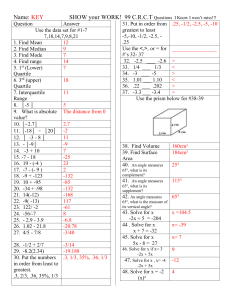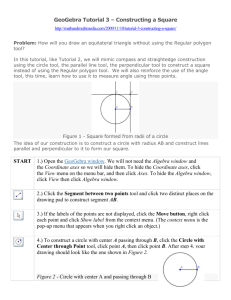GEO-VOCABULARY
advertisement
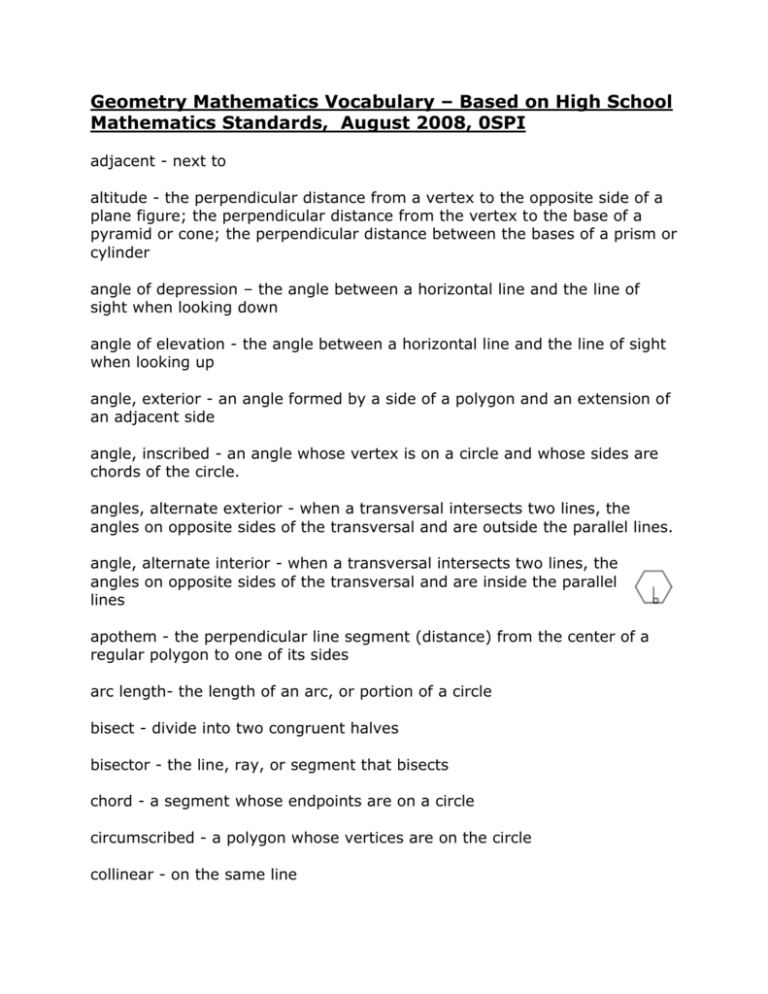
Geometry Mathematics Vocabulary – Based on High School Mathematics Standards, August 2008, 0SPI adjacent - next to altitude - the perpendicular distance from a vertex to the opposite side of a plane figure; the perpendicular distance from the vertex to the base of a pyramid or cone; the perpendicular distance between the bases of a prism or cylinder angle of depression – the angle between a horizontal line and the line of sight when looking down angle of elevation - the angle between a horizontal line and the line of sight when looking up angle, exterior - an angle formed by a side of a polygon and an extension of an adjacent side angle, inscribed - an angle whose vertex is on a circle and whose sides are chords of the circle. angles, alternate exterior - when a transversal intersects two lines, the angles on opposite sides of the transversal and are outside the parallel lines. angle, alternate interior - when a transversal intersects two lines, the angles on opposite sides of the transversal and are inside the parallel lines apothem - the perpendicular line segment (distance) from the center of a regular polygon to one of its sides arc length- the length of an arc, or portion of a circle bisect - divide into two congruent halves bisector - the line, ray, or segment that bisects chord - a segment whose endpoints are on a circle circumscribed - a polygon whose vertices are on the circle collinear - on the same line compass - a tool used to make circles and arcs construction - an accurate image of a figure made using only a straightedge and a compass contrapositive - a conditional statement where the hypothesis and conclusion are reversed and negated. If p, then q→ If not q, then not p converse - a conditional statement where the hypothesis and conclusion are reversed If p, the q→ If q, then p co-planar - in the same plane cosine/cos - in a right triangle, the ratio of the length of the leg adjacent to the reference angle to the length of the hypotenuse. counterexample - an example that shows that a conjecture is not always true. endpoint - either of two points marking the end of a line segment. equidistant - equally distant. inscribed - an angle or polygon whose vertices are part of another figure invalid- not true. inverse (transformation)Inverse- a conditional statement where the hypothesis and conclution are both negated If p, then q→ if not p, then not q. lateral (surface area) - the curved surface of a cone or cylinder. median (triangle)- a segment from a vertex to the midpoint of the opposite side. midpoint - the point on a line segment that divides into two congruent segments. noncollinear - not on the same line. oblique - lines that are not horizontal or vertical; a relationship between lines and/or plane figures that is not perpendicular or parallel. opposite - symmetrically opposed in positon or direction. plane - a flat surface with infinite length and width but no thinkness. postulate - a statement that is accepted as true. proof - a logical argument that shows why a statement must be true. prove - to verify the accuracy of (calculation or demonstration by an independent process). radius of a regular polygon- the radius of the inscribed circle is the apothem of the regular polygon; the radius of the circumscribed circle is the distance from the center of the regular polygon to a vertex. ray- a part of a line that has one endpoint and goes on infinitely in one direction→ rotational symmetry- a property of a figure that is mapped onto itself by a rotation of 180 degrees or less. scale factor - in a dilation, the ratio of the length of a segment in the preimage to the length of the corresponding segment in the image. secant - the inverse of the cosine function. sector (circle) - the region bounded by two radii and the arc they intercept. sine/sin - in a right triangle, the ratio of the leg opposite the reference angle to the length of the hypotenuse skew - non-coplanar lines that do not intersect sufficient (proof) - a condition whose truth is enough to be sure a statement is true tangent (circle) - a line in the plane of a circle that intersects the circle in exactly one point tangent/tan - in a right triangle, the ratio of the length of the leg opposite the reference angle to the length of the adjacent leg theorem - a mathematical statement that can be shown to be true based on postulates, definitions, or other proven theorems
